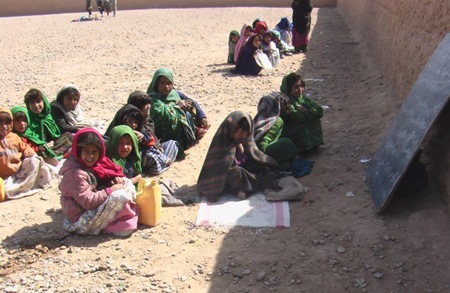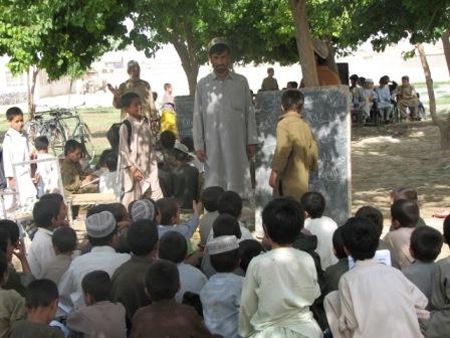IRIN, September 22, 2008
Attacks deprive 300,000 students of education in Afghanistan
Armed men associated with Taliban insurgents reportedly cut off the ears of a teacher in Zabul Province on 14 September
KANDAHAR - Zulaikha, 14, was the top student in her class last year but has been unable to attend school this year because of increased attacks on schools, rampant insecurity and threats to students and their families.

Millions of school-age Afghan children do not go to schools due to insecurity, conservative traditions, poverty and other problems, according to Oxfam International. (IRIN photo)
"I wanted to become a doctor and treat poor and ill people," she told IRIN at her home in the outskirts of Kandahar city in southern Afghanistan.
Taliban insurgents oppose female education and work and have frequently torched schools, killed school employees and circulated letters warning parents not to send their children, particularly girls, to school.
"We don't object to our daughter's education but we also don't want her to be killed on the way to school or her family members killed because of her going to school," said Zulaikha's father, Abdul Rahman.
Afghanistan has made impressive progress in primary and secondary education since the downfall of the Taliban regime in late 2001.
At least 3,500 schools have been built since 2002 and hundreds more are planned. More than six million students, about 30 percent girls, are enrolled in 11,000 schools across the country, compared with about one million boys only in 2000, according to the Ministry of Education (MoE).
However, resurgent Taliban and worsening security have put the country's hard-won educational achievements at serious risk.
Education denied
More than 600 primary, secondary and high schools are closed, mostly in the volatile southern provinces, because of prevalent insecurity and attacks on formal education, the MoE said.
"In 45 districts of 12 provinces about 610-620 schools have been closed," Hamid Elmi, a spokesman for the MoE, told IRIN, adding that efforts were under way to re-open some schools through community support.
Most of the closures are in the four southern provinces of Helmand, Kandahar, Zabul and Urozgan, where the conflict is having a greater effect than elsewhere. "Up to 80 percent of schools are closed in these four provinces," Elmi said.
In the worst-affected Helmand Province, only 54 schools, primarily for boys, are functioning, against 223 schools that were open in 2002, according to MoE statistics.
Consequently, more than 300,000 students have been deprived of an education in 12 provinces, according to MoE officials.
Punishments
The MoE said 99 schools have been attacked, torched and/or destroyed by armed assailants this year and 117 similar cases were reported in 2007.

Increased attacks on educational facilities and students have shut over 600 schools in 12 volatile provinces, MoE says (IRIN photo)
Dozens of students, some as young as seven, and teachers have been killed or injured by armed assailants over the past two years.
Armed men associated with Taliban insurgents reportedly cut off the ears of a teacher in Zabul Province on 14 September as a sign of punishment to those who support education.
In addition, Taliban insurgents in August reportedly attacked trucks carrying textbooks from Kabul to Kandahar province and burnt tens of thousands of books, the MoE said.
Taliban denial
A purported Taliban spokesman, Qari Yosuf Ahmadi, denied the insurgents' involvement in attacks on schools and students.
"Our Mujahideen have not attacked schools and schoolchildren," Ahmadi told IRIN via telephone from an unidentified location.
"Criminals - whom the government cannot stop - are carrying out such attacks," he said.
The Taliban imposed a strict ban on females' education and employment and enforced an Islamic curriculum for boys during their reign (1996-2001).
IRIN last year received a warning letter ostensibly issued by the Taliban in which attacks on schools and students were supported.
The government blamed the Taliban for attacks on educational facilities and school employees.
"The Taliban are attacking everything related to education because they need illiterate youths to join their ranks," Elmi of the MoE said.
Characters Count: 5259
